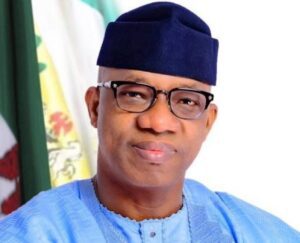
Post-consolidation ushered in era of stronger capital base for Nigerian Commercial banks — Ken Opara, Ph.D., FCIB
Dr. Ken Opara is the President/Chairman of Council of The Chartered Institute of Bankers of Nigeria (CIBN). He is also an Executive Director with Fidelity Bank Plc, one of the leading financial institutions in Nigeria. He knew from the outset, where and what he wanted in life – the reason he vigorously pursued his dream with everything in him. Those sacrifices have paid off and today, Ken is not only an accomplished banker but also the Number 1 banker in Nigeria being the current President/Chairman of Council of Nigeria’s foremost body responsible for ensuring ethics and professionalism in the banking industry, The Chartered Institute of Bankers of Nigeria (CIBN).No wonder upon his election, Dr. Opara immediately hit the ground running, initiating policies and programmes that focus on innovating the banking profession. His FUTURE agenda is a clear and well-articulated programme policy that defines an enduring pathway for the institute. In this exclusive chat, Dr. Opara articulated more about his upbringing, vision, and plan for CIBN and the Banking Industry.
Sir, congratulations on your election as the 22nd President / Chairman, Governing Council of the Chartered Institute of Bankers of Nigeria (CIBN)
Thank you very much. It is indeed a great honour to serve our revered Institute, the Chartered Institute of Bankers of Nigeria. Kudos to our founding fathers for their uncommon vision. I appreciate our past presidents, the Registrar/CEO, and all staff of the Institute for their unwavering support in the past and at present in building legacy, ethics, and professionalism in the conduct of banking activities in the industry.
Kindly take our esteemed readers through who Dr. Ken Opara is – your upbringing, career, and journey to becoming the President of CIBN
I was born and had my early life in Imo State, South-East Nigeria. I hold B.Sc. in Finance with Second Class Upper and an MBA in Banking & Finance from the University of Nigeria, Nsukka, and Ph.D. in credit Management from the International University of Panama.
I also attended executive management and professional programmes in top institutions around the world including Harvard Business School, Kellogg School of Management, Wharton Executive Business School (University of Pennsylvania), INSEAD International Business School, Lagos Business School, among others.
My professional experience spans over a period of 31 years. I have worked with several financial institutions. Due to my focus and ingenuity, I distinguished myself in the profession, rising through the ranks to the top. Currently, I am an Executive Director at Fidelity Bank where I oversee the Bank’s largest business directorate with many remarkable achievements to show.
As a professional banker with a great passion for maintaining the dignity of the banking profession, I have been a mentor and a great source of inspiration to young and upcoming members of the profession. Within the period of my leadership, the CIBN has continued to be of a great impact, especially through the reorganisation of the CIBN Mentoring Scheme where young bankers are coached on the ethics of banking and key areas to help them become well-rounded professionals in the field of banking. I am an Associate member of the Institute of Certified Pension of Nigeria as well as an Associate of the Chartered Institute of Credit Administration.
I am a Christian, married with children.
Looking at your profile, one could see that you have had experience in diverse areas of banking including Credit, Treasury, Retail, Consumer and Commercial Banking, International Operations and Corporate Banking. How would you describe these experiences, and which would you say is the most challenging?
I have had the privilege to work across different functions in the banking industry, both banking operations and business development. Each of these functions came with its unique challenges and there were key learnings for me as each role prepared me for the next, all the way to the position I occupy today. I love to describe myself as one person who is open to learning and who loves to embrace opportunities for continuous growth.
During your acceptance speech, you encapsulated the strategic focus of your Administration under the acronym “FUTURE.” Obviously, you must have articulated steps toward achieving this plan. Kindly take our esteemed readers through these steps and how they fit into the overall vision and mission of the institute.
The Chartered Institute of Bankers of Nigeria prides itself as the foremost body that fosters ethics and professionalism in the conduct of banking activities in the Country. We hold dearly Integrity, Professionalism, Innovation and Ethics as core values that should be entrenched across the board.
Our mission within the two years of my presidency, therefore, is to be that dependable partner to the operators, consumers, and regulators towards embracing the critical challenge the future of banking has posed while building upon the solid structure that our leaders have led over the years, as well as supporting sound ethical practice.
Specifically, my Presidency is focused on innovating the banking profession in tandem with recent global realities. We came up with actionable initiatives to achieve this, which we summed up under the acronym “FUTURE” which is a strategic imperative that encapsulates a thorough evaluation of the immediate and long-term challenges and opportunities facing the banking industry and proffers actions steps required to navigate and succeed.
F – Financial innovation and transformation
U – Dealing with industries uncertainties
T – Trade and Finance Collaboration
U – Unveiling pathways for membership growth
R – Reengineering and Rebranding the industry business model around Gen Z
E – Ethical Conduct and Governance
Few months down the line, we have made remarkable progress under each of these initiatives under the Financial innovation and transformation initiative, we have signed and implemented MOU with the Fintech Association of Nigeria (FinTech NGR) and Financial Services Innovation (FSI) to deploy Fintech Certification for Nigerians for want to play in the Fintech industry.
We have gone far in the digitalization of all our members’ interface and core processes of the institute, including seamless financial transactions to ensure members get benefits instantly. We have energized our member’s portal for effective communication with the institute and provided digital ID cars for members use especially with our affinity partners (airlines, hotels, shopping malls, etc) to enhance members’ benefit.
In dealing with industry uncertainties, it is our desire to partner with various government agencies in making quality contributions towards budget and planning, as well as strengthen and equip our Centre for Financial Studies to drive strategic inputs into economic policies of the governments across the hierarchies. We have submitted communique and position papers on many national issues and are glad that some of our suggestions are reflected in some of the policies that the government is coming out with to manage the current economic challenges of the nation.
We have organized programmes on non-oil export aimed at stabilizing banks’ FX supply. Banks are encouraged to focus on this important FX spinner for export earnings. This will have a direct impact on the nation’s economy in general, in addition to reducing the pressure on the already stretched FX positions of banks. We have instituted a human capital development fund for training and retraining of industry workforce.
Trade and Finance Collaboration. As regards this initiative, we have executed several MOUs on joint capacity development programmes, workshops and content on financial literacy, inclusion and research on trade payment with the Pan-African Payment Settlement System (PAPSS,) Bankers Association for Finance and Trade (BAFT), AFREXIM Academy, European Banking & Financial Services Training Association (EBTN), World Financial Innovation Series (WFIS) and World Conference of Banking Institute (WCBI), Global Banking Education Standards (GBEStB); West African Bankers Association (WABA) Alliance of African Institutes and Bankers; AAIOB; Digital Institute; etc
Unveiling pathways for membership growth.
Several awareness programmes have been conducted and many Bank academics (FCMB, Ecobank, Stanbic IBTC and Keystone Banks). We are working with Heads of HRs of Banks and are glad to report that this is translating to membership growth. A formal launch of the Lagos Business School MBA/SMPACIB was done on November 4, 2022. This is designed as a pathway for membership of the Institute as it would allow interested candidates to run the MBA/SMP programme at the prestigious Lagos Business School and qualify with dual qualifications MBA/SMP and ACIB.
Reengineering and rebranding the industry’s business model around Gen-Z.
We have created a Gen-Z and innovation committee dedicated to achieving this initiative. The committee has conducted a useful report that would help drive membership. At our 2022 Annual Baking and Finance Conference held on September 13-14, 2022, we had the Gen Zs as part of our primary target audience with a cocktail event for all the millennials and Gen Zs at the conference. Following, we are looking forward to the maiden Edition of the annual GEN Zs forum in the second quarter of 2023.
Ethical conduct and Governance are core to our mandate. The code of conduct has been deployed to the newly licensed Banks including microfinance banks. As of August 2022, a total number of 37,873 staff of Banks have completed the attestation to the code of conduct in the Nigerian Banking Industry. As part of further strengthening the ethic and professionalism, we are instituting an annual Corporate Governance assessment framework and whistle blowing policy. We have completed and commissioned legacy projects at Federal Polytechnic, Nasarawa and Kano State Polytechnic, work has commenced at Olabisi Onabanjo University, Ogun State University. The Nnamdi Azikiwe University project will soon commence.
Part of the responsibilities of the Institute is to ensure ethical standards and professionalism among members. Are there plans by your administration to collaborate with professional bodies in achieving this?
Ensuring ethical standards is at the heart of our work at the CIBN. As a matter of fact, the very existence of the institute is to develop standards for banking practice and ensure that they are complied with. This is the reason the CIBN is empowered by law to enlist all banking professionals as its members, organise sufficient education for them to ensure that they are constantly reminded of the ethical standards to which the profession is called and expected to live up to.
So, to answer the question directly, yes, we have partnership with relevant bodies such as RIMAN, APBN, FinTech, etc. It is our hope that with renewed collaboration and focus, we will have a stronger ethics and professionalism culture not only in the banking industry but also across all strata of the financial services industry.
There have been speculations in some quarters that ex-bankers should be barred from acting as consultants to customers for a certain period, especially on those matters they had a vested interest in, maybe by virtue of their position either as CAEs or other officers of the bank, just like the statute of Limitation. What is your take on this?
I do not believe that a period should be set for ex-bankers during which they may not serve as consultants to customers of banks. As a matter of fact, the CIBN provides a practice license which permits ex-bankers upon retirement from the industry to provide professional banking services to interested members of the public, given their wealth of experience in the industry.
According to July 2022 statistics provided by EFInA (Enhancing Financial Innovation and Access), over 36 per cent of adults in Nigeria are financially excluded. These are persons who do not have access to high-quality financial products as described above. This creates a huge opportunity for the financial sector as DMBs have all begun building digital platforms to reach the unbanked and underbanked in Nigeria. However, this also comes with challenges around the security of the payment platforms and systems as fraudsters would work to take advantage of any loopholes to steal innocent members of the public.
So far, the banks are doing a lot, working collaboratively with CBN and other relevant agencies of government, both locally and internationally, to pre-empt the activities of these fraudsters with a view to always being a step ahead of them. We will continue to encourage and support activities in this regard.
Along with this, however, must also come consumer education. The public must be sensitised on the dangers and taught to mitigate them.
In any case, where an abuse of privilege is established against any ex-banker, or where there is a conflict of interest, the Ethics and Professionalism Sub-Committee of the CIBN is usually engaged to review and adjudicate as necessary.
Hence, I believe that there is sufficient control that will guide ex-bankers in discharging their professional responsibilities as consultants to members of the public who may be interested in their services.
How would you rate the performance of Nigerian banks, post-consolidation, especially in supporting the real sector of the economy which has proven to be the engine of growth of an economy?
Banks have played a major part in the support of the real sector, including agriculture. There have been specialised institutions set up or backed by the CBN to ensure that all opportunities are properly harnessed and provided with the required support for success. Within the banks, there are specialised desks which oversee businesses in the real sector with a view to offering all the value necessary for growth. There’s no doubt, post-consolidation ushered in an era of stronger capital base for Nigerian Commercial banks. The enhanced capacity has enabled them to support various sectors of the economy, and evidently so.
However, the real sector growth required cannot be solely funded by the banks without collaboration. The Banks in response are in partnership with Development Finance Institutions (“DFI’s”) for the purpose of lending to SMEs operating in the real sectors of the economy. Some of the DFIs include the African Import-Export Bank (“Afreximbank”), African Development Bank (“AFDB”), Bank of Industries (“BOI”), and Development Bank of Nigeria (“DBN”).
Under the partnership, the funds are provided by the DFIs while disbursement to qualified customers rests with the Bank. Qualified SME customers are assessed and appraised by the Banks according to their internal risk management process and criteria before deciding whether to extend the loan. The Bank assumes the credit risks of the loans extended under these programmes and is also responsible for the ongoing monitoring of the loans extended.
Additionally, the Central Bank of Nigeria has made available several billions of naira in intervention programmes targeted at spurring growth in the real sector of the economy. The Real Sector Support Facility (RSSF) for example does not only provide funding but does at a single digit interest rate.
These are impressive developments worthy of recognition. We are not there yet. There is still so much ground to cover. For instance, we still have major infrastructural gaps in power/energy, transport and other areas that are key to economic development. These gaps require the support of CBN by way of specialized funds to address. The Banks will also pay a major role in the administration of these funds.
Fortunately, the Central Bank of Nigeria is about to launch the Infrastructure Company Limited (InfracCo). We need more of those specialised institutions.
The CBN has been consistent in driving financial inclusion in the Nigeria Banking space, however, like every good thing, the policy comes with its own challenges, part of which is the astronomical rise in incidences of fraud via FinTech platforms. What do you suggest as practical solutions to stem this tide?
Like you rightly pointed out, every good policy will have its challenges. It is the same for financial inclusion. Financial inclusion is the provision of a broad range of high-quality financial products, and pensions, which are relevant, appropriate, and affordable for the entire adult population, especially the low-income segment.
As a result of the major strides being made in the financial inclusion area, there has also been an upsurge in cybercrimes. The criminals keep looking for loopholes in the existing and newly introduced payment systems through which they can defraud unsuspecting members of the public. However, each institution is expected to continue to put in place adequate controls to migrate the risk of attacks. Internal control systems should also be strengthened for early identification for the vulnerability areas with a view to building required firewalls to reduce the possibility of an untoward incident.



